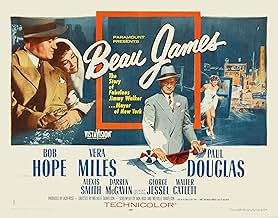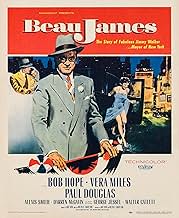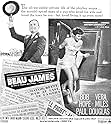Ajouter une intrigue dans votre langueBiopic of the political career of Jimmy Walker, flamboyant and somewhat corrupt Mayor of New York City from 1926-1932.Biopic of the political career of Jimmy Walker, flamboyant and somewhat corrupt Mayor of New York City from 1926-1932.Biopic of the political career of Jimmy Walker, flamboyant and somewhat corrupt Mayor of New York City from 1926-1932.
- Réalisation
- Scénario
- Casting principal
Eric Alden
- Reporter
- (non crédité)
Babette Bain
- Puerto Rican Child
- (non crédité)
Russ Bender
- Reporter
- (non crédité)
Jack Benny
- Jack Benny
- (non crédité)
John Benson
- Photographer
- (non crédité)
Avis à la une
Having watched this movie many times -- it's in my library, I firmly believe that the role could only have been played by Bob Hope. To my mind, this is his best performance. That coupled with an excellent cast, highlighted by the duet with Jimmy Durante (and Jack Benny's cameo) make this a thoroughly enjoyable movie to watch -- just for fun. >
After seeing "Beau James" I was left wondering..."why would they want to make a movie out of THIS??". After all, Mayor Jimmy Walker was far from being honest or virtuous. And yet, oddly, the film is trying to say that he was KINDA these things.
The film is a Hollywoodization of the career of Jimmy Walker (Bob Hope) once he became mayor of New York City. Mostly, it shows him worried about his wardrobe, taking bribes and being a man adored by New Yorkers. But, the object lesson appears to be "He wasn't nearly as dishonest as he could have been!". Huh?
For me, by the time the movie ended I was left with a strange sense of confusion. Why was Walker worthy of a biopic? And, why should I care about his love life? And, was Bob Hope playing Walker...or Bob Hope?
The film is a Hollywoodization of the career of Jimmy Walker (Bob Hope) once he became mayor of New York City. Mostly, it shows him worried about his wardrobe, taking bribes and being a man adored by New Yorkers. But, the object lesson appears to be "He wasn't nearly as dishonest as he could have been!". Huh?
For me, by the time the movie ended I was left with a strange sense of confusion. Why was Walker worthy of a biopic? And, why should I care about his love life? And, was Bob Hope playing Walker...or Bob Hope?
Bob Hope turned in a great performance as N.Y. Mayor James Walker in this 1957 film.
While the film did not delve into the exact intricacies of the corruption of the Walker Administration, we do have Judge Seabury heading the investigation prompted by Gov. Roosevelt, who wanted that nomination in 1932 and would use Walker's alleged corruption to get it.
Remember the song- the little tin box? That best describes what was going on when Walker, a really decent not-too bright guy, let corrupt officials run the show at City Hall.
Adored by the people at first,(Will You Remember Me in December is sung with zest), he can't accept the booing he encounters at a baseball game, once the corruption details start coming out.
Adding fuel to the fire is Walker's abandonment of his wife for actress Betty Compton, played by Vera Miles. Walker eventually resigned and went with Compton to Mexico.
While the film did not delve into the exact intricacies of the corruption of the Walker Administration, we do have Judge Seabury heading the investigation prompted by Gov. Roosevelt, who wanted that nomination in 1932 and would use Walker's alleged corruption to get it.
Remember the song- the little tin box? That best describes what was going on when Walker, a really decent not-too bright guy, let corrupt officials run the show at City Hall.
Adored by the people at first,(Will You Remember Me in December is sung with zest), he can't accept the booing he encounters at a baseball game, once the corruption details start coming out.
Adding fuel to the fire is Walker's abandonment of his wife for actress Betty Compton, played by Vera Miles. Walker eventually resigned and went with Compton to Mexico.
I was a teenager when James J. Walker was the Mayor of New York. Bob Hope doesn't look anything like him but catches the essence of his exuberant spirits and lack of responsibility very well. The narration by Walter Winchell adds just the right touch.
Paul Douglas is perfect as the Tammany boss. Hope is especially terrific in the dramatic conflict and emotional scenes with both Alexis Smith and Vera Miles. It makes me wish Hope did more straight-up dramas. It is especially a shame in retrospect, because after Beau James, Hope really never had the opportunity to make a good movie again (unless you count Critic's Choice which I don't).
If you enjoy nostalgic sad-and-funny movies about New York, this is one for you.
Paul Douglas is perfect as the Tammany boss. Hope is especially terrific in the dramatic conflict and emotional scenes with both Alexis Smith and Vera Miles. It makes me wish Hope did more straight-up dramas. It is especially a shame in retrospect, because after Beau James, Hope really never had the opportunity to make a good movie again (unless you count Critic's Choice which I don't).
If you enjoy nostalgic sad-and-funny movies about New York, this is one for you.
I believe it was Walter Winchell who coined that nickname for James J. Walker, Mayor of New York from 1926 to 1932 and the subject of this biographical film starring Bob Hope. It was Hope's last stab at a serious dramatic part. While he does well in it, Hope never tried as serious a role again in his career.
Jimmy Walker was the Majority leader of the State Senate and was the personal choice of Governor Alfred E. Smith to be Mayor of New York. Then as now, Republican mayors of New York City were a rarity, the Democratic nomination was sufficient guarantee to be elected.
Al Smith had dreams of being the Democratic presidential candidate. He almost was in 1924, but could not get past William Gibbs McAdoo that year in the famous 103 ballot convention that eventually turned to compromise dark horse candidate John W. Davis who went down in November to Calvin Coolidge. Smith wanted to secure his home base, but the mayoralty of New York and the patronage of the office was controlled by Smith's arch enemy, publisher William Randolph Hearst and his stooge Mayor John F. Hylan. Smith ran Walker in the 1925 primary and beat Hylan and then Walker handily won the General Election.
Smith knew Walker was a lightweight and he took the unusual step of having a gubernatorial office put in City Hall where he would be at least once a week, keeping tabs on Jimmy. Smith became the Democratic presidential candidate in 1928 and lost to Herbert Hoover. No longer governor, Smith was not around to keep Walker on a short leash. That's when he got into trouble.
Walker was a colorful figure during Prohibition. He and Smith were both unalterably opposed to the idea and Smith even served notice that the law enforcement arm of New York State would not be wasting its time on policing the drinking habits of New Yorkers. Walker got the nickname the Night Mayor of New York because as often as not he'd sleep all day and be partying all night at the famous Central Park Casino.
It was there that Walker met showgirl and began a long term affair with her. His marriage to his wife Allie was long over, but for appearance's sake, for the millions of Catholic voters in New York he kept the facade up.
Times have certainly changed. We now have a former Mayor of New York, named Rudolph Giuliani running for president with three marriages to his credit and a nasty divorce that got spread out in the tabloids.
Nobody ever mentioned Walker and president in the same breath. It was trouble enough to keep him paying attention to his job as mayor. The cronies he had from Tammany Hall ran wild, especially when Smith was no longer governor to keep them and him in line. During the boom times of the Twenties, people laughed at his colorful antics, but come the Depression and the stories of graft became routine newspaper stories, public opinion turned against Walker overnight.
Bob Hope made a fine Jimmy Walker and the two women in his life, Vera Miles as Betty and Alexis Smith as Allie give him good support. In one of his last films, Walter Catlett makes a brief appearance as Alfred E. Smith, and the rest of the cast is headed by Paul Douglas as a Tammany boss and Darren McGavin as Charles Hand, Walker's press secretary and conscience.
Beau James is a colorful account of a colorful era. It certainly as a film version of his life one that Jimmy Walker would have approved of.
Jimmy Walker was the Majority leader of the State Senate and was the personal choice of Governor Alfred E. Smith to be Mayor of New York. Then as now, Republican mayors of New York City were a rarity, the Democratic nomination was sufficient guarantee to be elected.
Al Smith had dreams of being the Democratic presidential candidate. He almost was in 1924, but could not get past William Gibbs McAdoo that year in the famous 103 ballot convention that eventually turned to compromise dark horse candidate John W. Davis who went down in November to Calvin Coolidge. Smith wanted to secure his home base, but the mayoralty of New York and the patronage of the office was controlled by Smith's arch enemy, publisher William Randolph Hearst and his stooge Mayor John F. Hylan. Smith ran Walker in the 1925 primary and beat Hylan and then Walker handily won the General Election.
Smith knew Walker was a lightweight and he took the unusual step of having a gubernatorial office put in City Hall where he would be at least once a week, keeping tabs on Jimmy. Smith became the Democratic presidential candidate in 1928 and lost to Herbert Hoover. No longer governor, Smith was not around to keep Walker on a short leash. That's when he got into trouble.
Walker was a colorful figure during Prohibition. He and Smith were both unalterably opposed to the idea and Smith even served notice that the law enforcement arm of New York State would not be wasting its time on policing the drinking habits of New Yorkers. Walker got the nickname the Night Mayor of New York because as often as not he'd sleep all day and be partying all night at the famous Central Park Casino.
It was there that Walker met showgirl and began a long term affair with her. His marriage to his wife Allie was long over, but for appearance's sake, for the millions of Catholic voters in New York he kept the facade up.
Times have certainly changed. We now have a former Mayor of New York, named Rudolph Giuliani running for president with three marriages to his credit and a nasty divorce that got spread out in the tabloids.
Nobody ever mentioned Walker and president in the same breath. It was trouble enough to keep him paying attention to his job as mayor. The cronies he had from Tammany Hall ran wild, especially when Smith was no longer governor to keep them and him in line. During the boom times of the Twenties, people laughed at his colorful antics, but come the Depression and the stories of graft became routine newspaper stories, public opinion turned against Walker overnight.
Bob Hope made a fine Jimmy Walker and the two women in his life, Vera Miles as Betty and Alexis Smith as Allie give him good support. In one of his last films, Walter Catlett makes a brief appearance as Alfred E. Smith, and the rest of the cast is headed by Paul Douglas as a Tammany boss and Darren McGavin as Charles Hand, Walker's press secretary and conscience.
Beau James is a colorful account of a colorful era. It certainly as a film version of his life one that Jimmy Walker would have approved of.
Le saviez-vous
- GaffesMayor Walker is in a parade near movie's end. In the background is a 1955 or 1956 Cadillac.
- Citations
Mayor James J. 'Jimmy' Walker: Goodbye... but remember this: the voters always get what they deserve. I wasn't the only chump in this city. It took a lot of you to elect me.
- ConnexionsFollows La Glorieuse Parade (1942)
Meilleurs choix
Connectez-vous pour évaluer et suivre la liste de favoris afin de recevoir des recommandations personnalisées
- How long is Beau James?Alimenté par Alexa
Détails
- Date de sortie
- Pays d’origine
- Langues
- Aussi connu sous le nom de
- Beau James
- Lieux de tournage
- Sociétés de production
- Voir plus de crédits d'entreprise sur IMDbPro
Box-office
- Montant brut aux États-Unis et au Canada
- 1 750 000 $US
- Durée
- 1h 45min(105 min)
- Rapport de forme
- 1.85 : 1
Contribuer à cette page
Suggérer une modification ou ajouter du contenu manquant





































